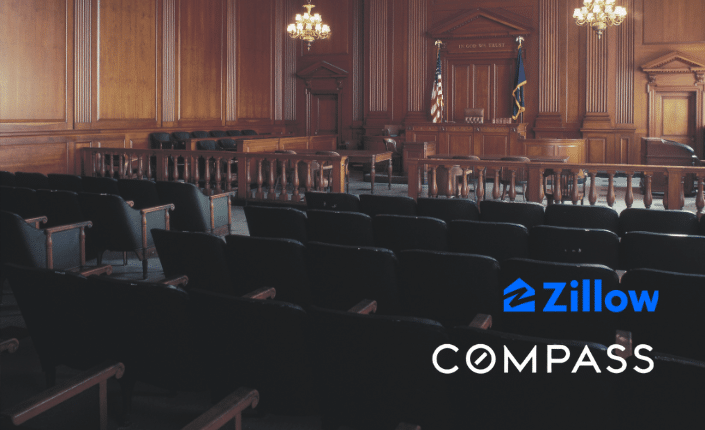
Zillow has hit back at Compass, accusing the brokerage of engaging in a hidden listings scheme.
Compass sued Zillow for its controversial listings ban in June, and now the portal giant has filed a counterclaim against Compass that rejects calls for an injunction against Zillow, while also accusing Compass of limiting market transparency and reducing competition by hiding listings from consumers.
The 40-page filing makes several major claims.
Zillow asserts that an injunction would be a disservice to the public interest; Compass lobbies the NAR to dilute its Clear Cooperation Policy; Compass has failed to provide evidence of its claims of irreparable harm; Compass lacks antitrust standing for all its claims; and Zillow did not conspire with Redfin to boycott Compass.
Zillow requested that courts deny Compass’s request for a preliminary injunction that would block the enforcement of its updated listing standards (including banning listings from appearing on Zillow), while also branding Compass's messaging as contradictory.
Compass has developed a three-phase Hidden Listing Scheme, through which it can control consumers’ access to home listings, reduce competition, and increase commissions.
Compass should not be allowed to have it both ways by forcing Zillow to share the benefits of its audience while at the same time withholding from Zillow and its customers the benefits of the latest listings. The law does not allow Compass to force such terms on to Zillow, and the motion should be denied.
Compass uses double-speak to promote [its Hidden Listing Scheme]. Compass claims that the Scheme helps sellers do better and increases competition. But it tells buyers the opposite: ‘Maximize your chance of beating out the competition and potentially avoid bidding wars.’ Compass also claims that the Scheme helps sellers generate ‘demand among serious buyers’ yet concedes that most homes sell in Phase Three. And when a listing is published in Phase Three, the ‘days on market’ and price history are a blank slate, misleading buyers.
Compass’s Scheme benefits only Compass. The Scheme harms consumers by reducing transparency and liquidity, as multiple consumer advocacy groups have concluded.
Zillow argued its listings standards policy does not pose antitrust risks as it maximises transparency and competition in the market. After all, if everyone can see real estate listings, everyone has a chance to buy a home. An approach that Zillow believes Compass is exploiting for the well-being of its network of brokers, not day-to-day consumers.
A Zillow spokesperson told Inman:
"While Compass has been waging a campaign against market transparency to the detriment of consumers and agents, Zillow, by contrast, has a long history of providing transparency and equal access to real estate information, to the benefit of consumers and agents.
"We will not waver in that commitment. Their motion gets both the facts and the law wrong, and we will continue to defend against it to ensure that the integrity of a fair and competitive real estate marketplace remains intact."
Online Marketplaces recently interviewed Compass's Rory Golod on the PPW Podcast. Watch the full interview below:
CoStar has also weighed in on the controversy, with Andy Florance branding Zillow a "bully" in comments made earlier this week.